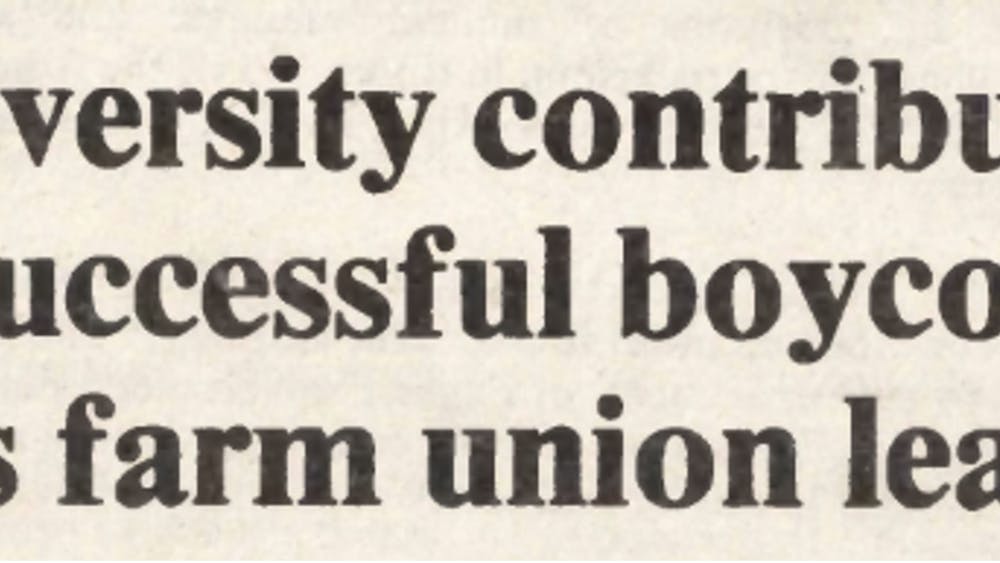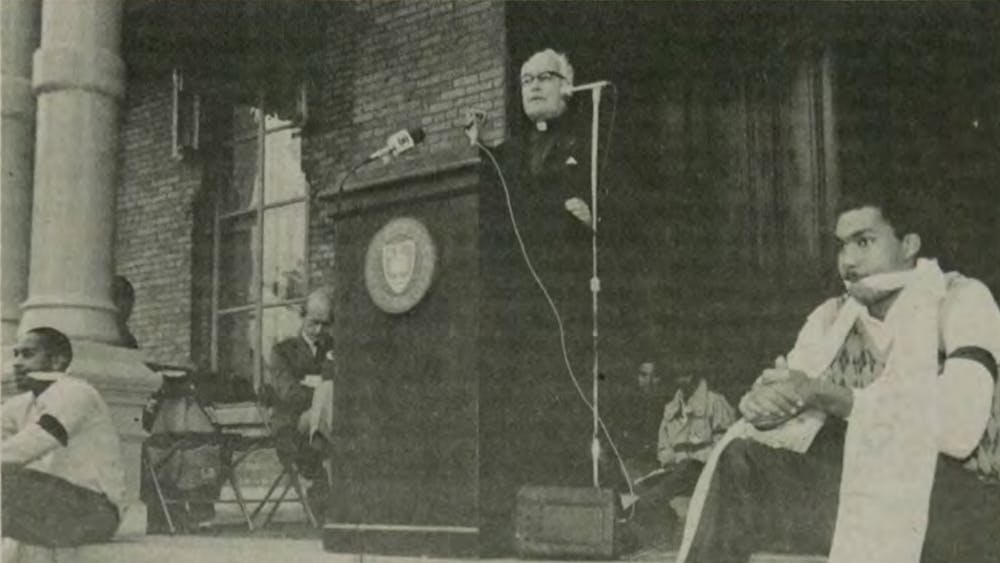In this episode of The Recap, host Ryan Peters shares stories covering a letter that reached University leadership, a philosophy professor who had an article published in Psychology Today and a petition calling for a Vatican investigation of the United States Conference of Catholic Bishops that 28 Notre Dame professors signed.
[audio mp3="https://ndsmcobserver.com/wp-content/uploads/2021/03/1614898149-e95c1ef34e22bd1.mp3"][/audio]
Transcript:
Ryan Peters: From the News Department of The Observer, this is The Recap. I’m Ryan Peters, and I’ll be hosting this episode of The Observer’s news podcast — serving Notre Dame, Saint Mary’s and Holy Cross.
Over the past week, the University has witnessed a significant drop in the number of positive COVID-19 cases. The 7-day moving average has fallen to 18.7 cases, after over two weeks with it hovering in the 30s. On Feb. 17, vice president for student affairs Erin Hoffmann Harding and vice president for campus safety and University operations Mike Seamon announced a suspension of all in-person student activities and a ban on students from entering other residence halls through at least March 1. As of March 4, there is still no update on when in-person student activities will resume.
Now, time for this week’s major news stories. As of Thursday, Feb. 25, a letter calling on the University to revise campus policies to improve student mental health had 1,576 signatures. Students make up the majority of the signatories, but the letter also has significant support from parents and community members. Here’s associate news editor Alysa Guffey, who reported on the story.
Alysa Guffey: The primary aims of the letter are for the University leadership to relax the dorm visitation policies, allow student organizations to hold in-person events and revise the lack of due process in the Campus Compact in order to improve students’ mental health on campus. Matthew Fischer, a freshman in Baumer Hall, signed the letter with the belief that the current restrictions make it too difficult for students to connect with friends.
Matthew Fischer: Being told, no you can’t do that, you can’t do that, it’s just really toying [and] taxing because you’re trying to make new friends and relationships just coming straight out of high school. And so, just kind of, I guess being disappointed but also when you’re trying to reach out and everything, there’s just like always a roadblock.
Ryan Peters: Fischer’s roommate, James DeMaria, shared a similar sentiment, saying the current COVID guidelines are not conducive to strong student mental health.
James DeMaria: In regards to mental health, I think a lot of what people are struggling with is feeling confined and feeling isolated and not being able to make new friends.
Alysa Guffey: In an email obtained by The Observer, vice president for student affairs Erin Hoffmann Harding responded to the letter saying the University shares the petitioners’ concern for student well-being and provides an array of mental health services available to students. Other figures in the Notre Dame community responded to the letter, including political science professor Jim McAdams. McAdams called the letter’s requests “disturbing and dangerous” and said the current restrictions are in place to protect students.
Ryan Peters: In more COVID news, philosophy professor Dr. Meghan Sullivan wrote an article published in Psychology Today, urging people to change their mindset regarding the COVID-19 pandemic. Now, to news writer Bella Laufenberg with coverage of the story.
Bella Laufenberg: Dr. Meghan Sullivan has spent her career studying the human perception of time, so she used her expertise to write an article, now published in Psychology Today, in which she calls on readers to use “mental time travel” as a way to get through the remainder of the pandemic. Sullivan uses mental time travel to describe humans’ ability to think outside of the present.
Meghan Sullivan: One of the things that makes it really special to be a human being is that we can do this kind of “mental time travel.” We can bounce around, and we imagine our lives as having these really long spread-out extensions in time.
Bella Laufenberg: Sullivan’s decision to not spend Christmas with her family due to the pandemic inspired her article. She said people need to use this idea of mental time travel so they fully consider the future benefits of a difficult decision — she said this is especially relevant during the ongoing pandemic.
Meghan Sullivan: But we want to make sure that when we’re not paying enough attention to the future, or not being willing to make big enough sacrifices now for a great future, that we’re paying attention to the stuff that really matters, like the risk and uncertainty.
Ryan Peters: To wrap things up, we’ll turn our attention to a petition calling for an investigation by the Vatican into the United States Conference of Catholic Bishops (USCCB) for alleged partisanship. The petition has over 21,500 signatories, with 28 of them being Notre Dame professors. Here’s news writer Maria Luisa Paul with the story.
Maria Luisa Paul: Faithful America, a grassroots, non-governmental Christian organization, called for an investigation into the USCCB after a National Catholic Reporter editorial accused the USCCB of “staunch Republican support.” President of the USCCB, Most Rev. Jose Gomez sparked outrage after releasing a statement on Inauguration Day in which he mentioned there will be “areas of strong opposition” towards the Biden administration.
Rev. Kevin Rhoades: There were some notes of hope in the statement, I say, but we weren’t going to not say anything about his position on some very fundamental values of our faith, and he [Biden] is Catholic. So we talked about abortion and marriage and religious freedom, and I don’t know how we could not talk about it. It wouldn’t be true. I mean, we have to be authentic teachers. We’re not going to be silent about the truths that we hold dear.
Ryan Peters: That was Most Rev. Kevin Rhoades, bishop of Fort Wayne-South Bend and chairman of USCCB’s Committee on Doctrine. While some like Rhoades supported Gomez’s statement, others criticized it. Chicago Cardinal Blase Cupich called the statement “ill-considered.” Professor of German language and literature and concurrent professor of philosophy Mark Roche also took issue with Gomez’s statement.
Mark Roche: I haven’t seen a consistent set of Catholic statements independently of partisanship. When the Democratic administration came in, certainly the Church is right to say it disagrees with its pro-choice position of the Democratic party, which has increased over the years. But there are so many issues where the Democratic policies line up very well [with] Catholic positions. And just as we didn’t hear enough criticism of the Republican administration, we don’t hear enough praise of the Democratic position.
Maria Luisa Paul: Professor of American democracy and chairperson of the political science department David Campbell warns that the increased polarization surrounding abortion and the Church’s strong stance on the issue links Catholicism with the Republican party and puts the Church in a “dangerous position.”
David Campbell: What people are going to remember is the position that’s taken. The bishops are going to emphasize abortion — which lines up with one party — and many reasonable people will infer, “Well, that must mean that the Catholic Church is supporting the Republican Party.”
Ryan Peters: That’s all for this episode of The Recap. Special thanks to news writers Alysa Guffey, Bella Laufenberg and Maria Luisa Paul. Join us next week for a new summary of the major headlines on the Notre Dame, Saint Mary’s and Holy Cross campuses. Signing off from The Observer news department, I’m Ryan Peters.
Music by Ryan Neff.
Read More
Trending









